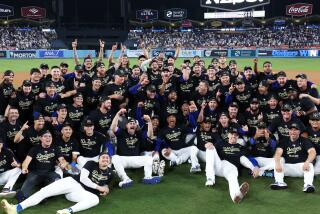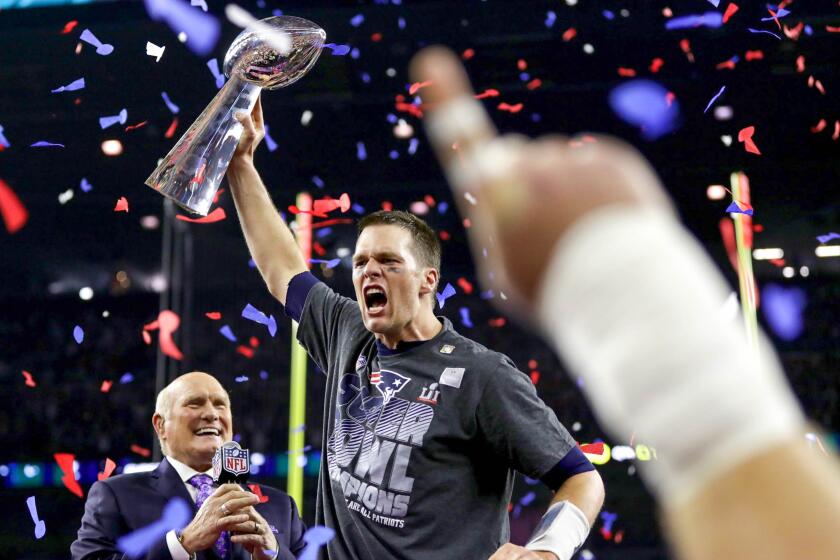Padres’ Long Season Getting Longer by the Day
- Share via
SAN DIEGO — It’s a familiar baseball conundrum: At what point in a season does it stop being early and become late? At what point does it become too late?
In early May, with injuries and ailing bats contributing to a struggling start in defense of their National League West title, the San Diego Padres have had to confront that conundrum.
After Friday’s 7-2 loss to the Cincinnati Reds, the Padres were last in the West at 12-20 and 8 1/2 games behind the division-leading Colorado Rockies.
Manager Bruce Bochy looked at the calendar and said, “We definitely feel a sense of urgency.
“You don’t want to get nine or 10 games back, even though it’s early, because you get leery about guys starting to press and lose confidence. There’s still a lot of confidence here, but it’s tougher when you’re chasing three teams. You can’t keep saying it’s a long season.”
There it is.
Less than a fifth of the way through a 162-game schedule, the Padres seem to have arrived at that early-late junction, the gray crossroads between confidence and self-doubt.
Said Tony Gwynn: “Everybody talks about it being early, but it’s kind of amazing to have played only 30 or so games and to be this far behind.
“Am I concerned? Definitely. It’s an indication that the rest of the division is playing pretty good baseball and we’ve dug a pretty good hole. You tell yourself to relax, but every opportunity that slips by adds up.”
Added Ken Caminiti: “To say that you’re not concerned would be [lying]. You hate to put yourself in a hole that’s impossible to get out of. We’re not there, but it’s as deep as I want to go.”
The Padres lost their last eight games in April and have lost 15 of their last 19. They were 3-9 in one-run games and 1-9 against teams with winning records.
The players had a meeting May 1--”We needed to know where everybody else’s mind is,” Gwynn said--but Caminiti shrugged and said, “That [meeting] got us one win. I mean, you can’t have a meeting every time you lose a game. The bottom line is, we’ve had no offense. We’re not swinging the bats. I still think we’re a better team than last year, but you can’t do it on paper.”
Said Bochy: “This is the longest period I’ve seen us go where we continually miss a key hit. We can all handle losing, but it’s more difficult when you’re in position to win and let it slip away.”
The Padres, perhaps, are being too hard on themselves.
Center fielder Steve Finley, first baseman Wally Joyner and pitcher Joey Hamilton were put on the disabled list in April, because of elbow, ankle and shoulder injuries, respectively, and third baseman Caminiti has been slowed by a tender hamstring while continuing to strengthen a post-operative shoulder.
Finley was activated last Tuesday, Joyner is due back Tuesday and Hamilton is scheduled to rejoin the rotation May 18.
“The key for us is keeping everyone healthy,” Caminiti said. “If we keep everyone healthy, things will happen.”
So far, a happening it isn’t.
The Padres are hitting .238 as a team and are near the National League cellar in on-base percentage. They have scored two or fewer runs 15 times, wasting some decent pitching.
Even with Hamilton on the disabled list, San Diego starters have averaged 6 2/3 innings, have an earned-run average of close to 3.00 and have limited the opposition to two runs or fewer 10 times. The Padres, however, are only 4-6 in those games, and the starting staff has an overall record of only 8-13, another illustration of the anemic offense.
“It’s a combination of things,” Gwynn said. “Guys are pressing and not executing. We’re all guilty.
“People talk about the injuries, but there’s no excuses. Until we execute, we’re going to struggle.”
It would be hard to indict Gwynn. He’s romancing .370 as usual, with an uncharacteristic seven home runs.
“We were swinging the bats great coming out of spring training, but this started opening day,” batting instructor Merv Rettenmund said.
“It was as if somebody flipped a switch. All of a sudden guys were pressing and we looked like a different team. It’s not the injuries, it’s just bad at-bats, and it’s a little disheartening coming off last year.
“I mean, everyone is quick to feel he’s a failure, but we’re only a month into [the schedule].”
The Padres cite last year, when they endured a 4-19 June slump and still won the division title, but they had the safety net of a 6 1/2-game lead going into that month.
“If we can pick up seven games in the next two months, if we’re around .500 at the All-Star break, we’ll be right in the thick of it,” General Manager Kevin Towers said. “There’s no panic.”
And no finger pointing, the Padres insist, although some continue to grumble about the loss of veteran second baseman Jody Reed in favor of Quilvio Veras, who is hitting 193.
However, most of the finger pointing has come from the stands, where fans have hammered left fielder Greg Vaughn, who batted .206--with 10 home runs--after his acquisition last July 31, received a three-year, $15-million contract during the winter and is now batting .176. He’s two for 27 with runners in scoring position.
Vaughn’s is a painful struggle compounded by Rickey Henderson’s .158 average as the left-field alternative. And Henderson is now on the disabled list.
Said Bochy, “It’s a humbling game, and Vaughny is being humbled. He seems to have the weight of the world on his shoulders, but that’s not to say we’re putting all of this on one guy. You win as a team and lose as a team.”
The manager received a lift this week when his son, Greg, a senior pitcher at Mt. Carmel High in the San Diego area, threw a no-hitter.
The way the Padre offense has been, a no-hitter wouldn’t have come as a surprise. But then it’s still early. Or is it?
More to Read
Go beyond the scoreboard
Get the latest on L.A.'s teams in the daily Sports Report newsletter.
You may occasionally receive promotional content from the Los Angeles Times.










